
Egyptian Journal of Biological Pest Control
Scope & Guideline
Unlocking new frontiers in sustainable agriculture.
Introduction
Aims and Scopes
- Biological Control Mechanisms:
Research on various biological agents such as fungi, bacteria, nematodes, and insects that can naturally regulate pest populations. This includes the study of their effectiveness, mechanisms of action, and ecological impacts. - Integrated Pest Management (IPM) Strategies:
Development and evaluation of comprehensive pest management strategies that combine biological control with cultural, physical, and chemical methods to minimize pest damage while reducing environmental impact. - Entomopathogenic Fungi and Nematodes:
Investigation into the pathogenicity and application of entomopathogenic fungi and nematodes as biocontrol agents against a wide range of agricultural pests, including their life cycles and host interactions. - Microbial Biopesticides:
Exploration of microbial formulations as biopesticides, including their production, efficacy, and safety in agricultural settings, aiming to replace or reduce chemical pesticide use. - Genetic and Molecular Studies:
Utilization of molecular techniques to characterize microbial strains, assess genetic diversity, and understand the underlying mechanisms of pest resistance and pathogen virulence. - Ecological and Environmental Impact Studies:
Assessment of the ecological consequences of implementing biological control measures, including impacts on non-target organisms and overall ecosystem health.
Trending and Emerging
- Climate-Responsive Pest Management:
Recent publications have increasingly addressed the need for pest management strategies that are adaptable to climate change, emphasizing the importance of resilience and sustainability in agricultural practices. - Molecular and Genetic Approaches in Biocontrol:
There is a growing trend towards employing molecular biology techniques to enhance the understanding of biocontrol agents, including genetic characterization and the development of genetically modified organisms for pest control. - Synergistic Effects of Biocontrol Agents:
Research focusing on the synergistic effects of combining different biological control agents is gaining traction, highlighting the potential for more effective pest management strategies. - Microbial Ecology and Biocontrol:
An increasing number of studies are exploring the ecological interactions between biocontrol agents and pests, as well as the role of microbial communities in enhancing pest control efficacy. - Sustainable Agricultural Practices:
There is a notable rise in research that integrates biological control with sustainable agricultural practices, reflecting a broader trend towards eco-friendly farming methods.
Declining or Waning
- Chemical Pesticide Studies:
Research focused on traditional chemical pesticides has become less frequent as the emphasis shifts toward sustainable and environmentally friendly pest management solutions. - Basic Entomological Studies:
There has been a noticeable decrease in purely descriptive studies of pest species, as the journal increasingly prioritizes applied research that offers practical solutions to pest management. - Invasive Pest Studies:
Publications focusing solely on invasive species without linking them to biological control measures are less common, possibly due to a growing emphasis on integrated approaches that include biological control.
Similar Journals
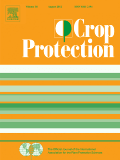
Crop Protection
Advancing sustainable solutions for global agriculture.Crop Protection is a leading academic journal in the field of Agronomy and Crop Science, published by Elsevier Science Ltd, and recognized for its high impact demonstrated by an impressive Q1 quartile ranking in 2023. With its ISSN 0261-2194 and E-ISSN 1873-6904, this esteemed publication has been a crucial source of research since its inception in 1982, continuing to provide valuable insights and advancements in crop protection strategies through 2024. The journal serves a diverse audience, including researchers, professionals, and students, eager to explore pioneering findings in pest management, herbicide development, and sustainable agricultural practices. While the journal does not offer open access options, its rigorous peer-review process ensures the highest quality of scholarly articles that contribute significantly to the agricultural and biological sciences, maintaining its respected position with a Scopus rank of #63 out of 406 in its category, placing it in the 84th percentile. Engaging with Crop Protection not only enriches knowledge but also promotes innovative solutions for global agricultural challenges.

JOURNAL OF NEMATOLOGY
Fostering Collaboration to Enhance Crop ProductivityJOURNAL OF NEMATOLOGY, published by the SOC NEMATOLOGISTS, serves as a crucial platform for cutting-edge research in the fields of nematology, agronomy, and crop science. With an ISSN of 0022-300X and an E-ISSN of 2640-396X, this esteemed journal has been an open-access resource since 2016, enabling a wider audience to engage with its findings. The journal is recognized for its high-quality publications, currently holding a Q2 ranking in Agronomy and Crop Science as per the 2023 category quartiles. With a Scopus rank of #171 out of 406 in Agricultural and Biological Sciences, it occupies a vital position in disseminating knowledge crucial for advancing research and practices related to nematodes and their impact on crop productivity. The JOURNAL OF NEMATOLOGY aims to foster collaboration among researchers, professionals, and students, ultimately contributing to the sustainability and productivity of agricultural systems.
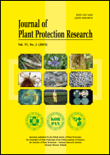
JOURNAL OF PLANT PROTECTION RESEARCH
Cultivating knowledge for resilient ecosystems.JOURNAL OF PLANT PROTECTION RESEARCH is a pivotal publication in the realm of agricultural sciences, dedicated to advancing our understanding of plant protection and pest management. Published by the INST OCHRONY ROSLIN, PANSTWOWY INST BADAWCZY in Poland, this journal has been an open-access venue since 2008, ensuring that research findings are readily accessible to a global audience. With an ISSN of 1427-4345 and E-ISSN of 1899-007X, it serves as a crucial platform for scholars and practitioners in the fields of Agronomy, Plant Science, and Soil Science. In the latest categorizations, it has achieved a Q3 ranking in these disciplines, reflecting its impact and significance within the scientific community. As the journal converges its scope from 2008 to 2024, it continues to address pressing issues in plant health and sustainability. Its strategic placement within the Scopus ranks offers valuable insights into agricultural and biological sciences, making it an essential read for those seeking to enhance their expertise in plant protection strategies.
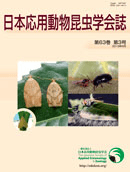
JAPANESE JOURNAL OF APPLIED ENTOMOLOGY AND ZOOLOGY
Unveiling the Secrets of Insect Behavior and EcologyJapanese Journal of Applied Entomology and Zoology is a premier publication in the field of Insect Science, offering a platform for researchers and practitioners to share their findings on applied entomology and zoology. Established in 1957 and published by the Japan Society of Applied Entomology and Zoology, this journal aims to foster the understanding of insect-related studies that impact agriculture, ecology, and biodiversity. With an ISSN of 0021-4914 and E-ISSN of 1347-6068, it serves as a crucial resource for both academics and industry professionals. While the journal currently resides in the Q4 category of the Scopus ranking for Insect Science with a percentile of 11th, it plays a significant role in providing valuable insights into insect behavior, systematics, and their ecological roles. Readers can benefit from its published research to drive innovations and solutions in pest management and conservation practices. As the journal continues to evolve, it reinforces its commitment to disseminating critical research that supports sustainable practices in entomology and zoology through its convergence extending to the year 2024.
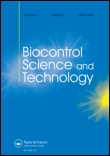
BIOCONTROL SCIENCE AND TECHNOLOGY
Cultivating Sustainable Practices Through Rigorous ResearchBIOCONTROL SCIENCE AND TECHNOLOGY is a premier, peer-reviewed journal published by Taylor & Francis Ltd that specializes in the dynamic fields of Agronomy and Insect Science. Established in 1991, this journal has garnered a reputation for disseminating high-quality, impactful research with an impressive 2023 Scopus rank of 53 out of 181 in Insect Science and 153 out of 406 in Agronomy, placing it in the Q2 category for both fields. With its ISSN 0958-3157 and E-ISSN 1360-0478, the journal serves as a vital resource for researchers, professionals, and students dedicated to advancing understanding and innovation in pest management and biocontrol strategies. Although not an open-access journal, it offers comprehensive insights that are crucial for professionals aiming to tackle agricultural challenges and enhance food security. The journal’s continuous coverage from 1991 to 2024 ensures that it remains at the forefront of significant advancements in biocontrol, making it an essential read for anyone interested in sustainable agricultural practices and integrated pest management.

JOURNAL OF PEST SCIENCE
Leading the way in multidisciplinary pest research.JOURNAL OF PEST SCIENCE, published by SPRINGER HEIDELBERG, is a premier academic journal dedicated to the multidisciplinary study of pest management, contributing significantly to the fields of Agronomy, Ecology, and Insect Science. With a history that spans back to 1925, this journal has established itself as a critical platform for disseminating innovative research, evidenced by its impressive Q1 rankings in multiple categories, including Ecology and Plant Science, as of 2023. The journal particularly excels in its contribution to Agricultural and Biological Sciences, holding a remarkable 98th percentile rank in Insect Science. By fostering open access, the JOURNAL OF PEST SCIENCE ensures broader dissemination and engagement with scientific advancements pertinent to pest control and management practices. Its commitment to publishing high-quality, peer-reviewed articles makes it an essential resource for researchers, professionals, and students looking to stay at the forefront of pest science and its application to sustainable agriculture and ecology.
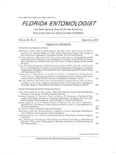
FLORIDA ENTOMOLOGIST
Exploring the Intricacies of Insect EcologyFLORIDA ENTOMOLOGIST is a prestigious peer-reviewed journal dedicated to the advancement of entomological sciences, published by Walter de Gruyter GmbH. Since its transition to open access in 1994, the journal has become a vital resource for researchers, students, and professionals in the fields of Insect Science and Ecology, Evolution, Behavior, and Systematics. With an impact factor ranking high in its category—Q2 in Insect Science and Q3 in Ecology, Evolution, Behavior and Systematics—the journal showcases significant findings and contributions that shape our understanding of insect biology and its implications for ecological systems. The journal is indexed in Scopus, further establishing its relevance, with current rankings reflecting its competitive standing within Agricultural and Biological Sciences. Published continuously since 1982, FLORIDA ENTOMOLOGIST not only facilitates the dissemination of knowledge among entomologists but also encourages interdisciplinary collaboration, making it an essential publication for anyone invested in the scientific study of insects.

Erwerbs-Obstbau
Empowering Agricultural Practices with Research.Erwerbs-Obstbau is a pivotal journal dedicated to the field of horticulture, focusing on research concerning the cultivation and production of fruit. Published by Springer in Germany, this journal plays a crucial role in disseminating innovative findings and advancing the knowledge base within the agricultural and biological sciences landscape. With an impact factor that places it in the Q3 category of horticultural journals, it ranks #68 out of 115 in its field according to Scopus, demonstrating its relevance and contribution to ongoing debates and advancements in horticulture practices. Researchers, professionals, and students benefit from the insights and developments shared in its pages, as the journal has been successfully converging data and insights since its inception in 1983, including continuous contributions from 1996 to the present. Although the journal currently does not offer Open Access, its comprehensive articles are invaluable for anyone invested in the science of fruit cultivation and production.
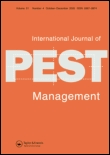
INTERNATIONAL JOURNAL OF PEST MANAGEMENT
Bridging the gap between research and real-world pest management solutions.The INTERNATIONAL JOURNAL OF PEST MANAGEMENT, published by TAYLOR & FRANCIS LTD, is a prestigious academic journal that has established itself as a vital resource in the fields of Agronomy, Crop Science, and Insect Science. With an ISSN of 0967-0874 and E-ISSN 1366-5863, this journal has been disseminating critical research since its inception in 1993 and continues to shape the discourse through to 2024. The journal occupies a significant position in the academic community, currently ranked Q2 in Agronomy and Crop Science and Q3 in Insect Science, based on its impressive Scopus ranks (Agricultural and Biological Sciences: Insect Science rank #33/181; Agronomy and Crop Science rank #109/406). Offering rapid insights into pest management strategies, this journal is essential for researchers, professionals, and students seeking to enhance their understanding of pest dynamics and management practices in an agronomic context. Though it does not provide open access options, its rigorous peer-review process ensures high-quality, impactful publications that contribute significantly to sustainable agricultural practices.

NEMATROPICA
Unveiling the Role of Nematodes in Crop HealthNEMATROPICA is a distinguished academic journal dedicated to advancing the field of nematology and its relevance to agronomy and crop science. Published by the Organization of Tropical American Nematologists, this journal serves as a crucial platform for researchers, professionals, and students to disseminate original research and reviews focused on the biology, ecology, and management of nematodes within agricultural systems. With an evolving history since its inception in 1988, NEMATROPICA has consolidated its reputation, currently holding a Q3 classification in Agronomy and Crop Science for 2023, indicating its respected standing within the field. Although the journal is not open access, its valuable contributions underscore the importance of nematodes in ecological interactions and pest management strategies, making it essential reading for those committed to enhancing agricultural productivity and sustainability. The journal's contact address is Auburn University, Department of Plant Pathology, Auburn, AL 36849, United States.